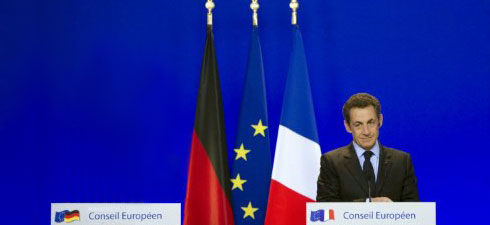As Europe’s “federal destiny” draws nearer, a second flaw in the European project, far deeper than the contradiction between the monetary and fiscal policies of the eurozone nations, is coming into view.
Everyone agrees that Europe faces a clear choice either to abandon the euro or make a quantum leap towards “true European economic government”, as President Sarkozy put it after the 16 August meeting in Paris.
In practice this will mean two things. The first is a partial replacement of the debts of national governments by so-called eurobonds, jointly guaranteed by all eurozone nations and their taxpayers. This has been strongly opposed by Germany, Austria and other creditor nations, and was put off again during the meeting with German chancelor Angela Merkel, but resistance is weakening.
The second condition, demanded as a quid pro quo by the creditor countries, will be centralised control over taxes and government spending by a federal European treasury with veto powers over the fiscal policies of all member states. This has, of course, been strongly opposed by Greece, Italy, Spain and other debtor nations, but their resistance is also weakening. But putting Herman Van Rompuy, the EU President, in charge of a new committee was not much of a step down that route.
However, the first fundamental flaw of the euro project — the contradiction between a single currency and a multiplicity of divergent national fiscal policies — may still eventually be resolved in favour of the federal solution. This was always the intention of the euro’s ultimate founding fathers, François Mitterrand and Helmut Kohl.
Now Europe must face the second flaw — that German and French conceptions of a federal Europe are mutually incompatible. Not only do the two nations have very different theories of government centralisation and devolution, much more crudely their visions of a federal Europe are fundamentally incompatible in terms of simple power politics.
Read the full article in The Times ...
Second opinion
No time for Brussels etiquette
The Financial Times’s commentator Martin Sandbu agrees that the only thing stopping European governments from backing eurobonds is Germany -- and that the solution may be to leave Berlin behind.
"Take the eurozone without Germany and its most like-minded partners – the Netherlands, Austria, Finland and Slovakia. Also exclude Greece. The remaining 11 countries can create a €3,500bn bond market with macroeconomic figures only marginally worse than those for the eurozone as a whole.
It would fly in the face of Brussels etiquette for a subset of the eurozone to go it alone. But it is no less contrary to the European spirit for those willing to pool sovereignty to protect their well-being to be held up by German recalcitrance. This would be justified if Berlin had to pay for the project – but the point is that it would not.
How would such a move go down in Germany? Economically, Berlin may find its borrowing advantage eroded if investors see an alternative euro-denominated bond market that is bigger and economically attractive. Politically, voters may fear being left behind by European integration even more than they fear becoming the paymasters of Europe. If so, the power is really in the hands of the eurozone’s other members. They should use it."
Was this article useful? If so we are delighted!
It is freely available because we believe that the right to free and independent information is essential for democracy. But this right is not guaranteed forever, and independence comes at a cost. We need your support in order to continue publishing independent, multilingual news for all Europeans.
Discover our subscription offers and their exclusive benefits and become a member of our community now!












